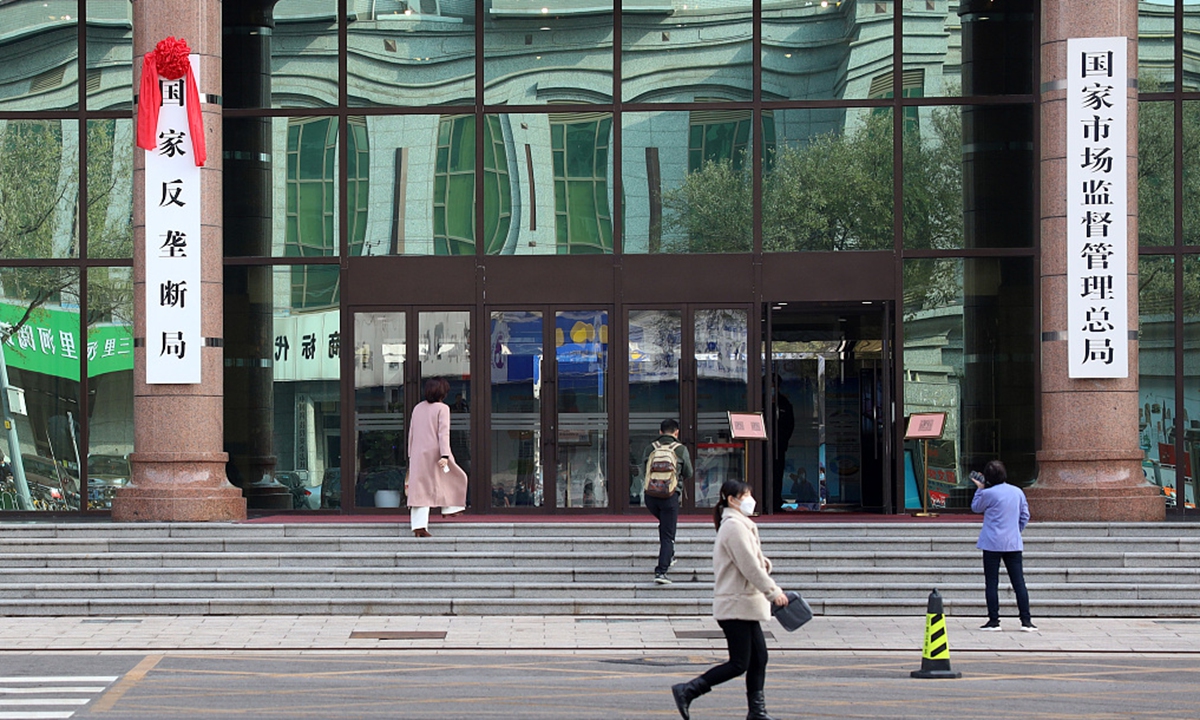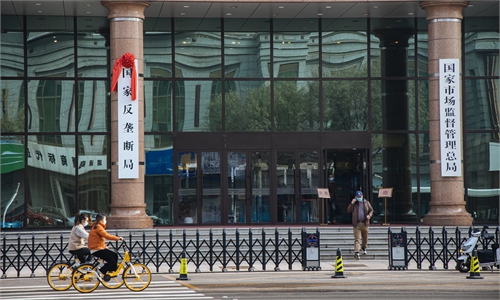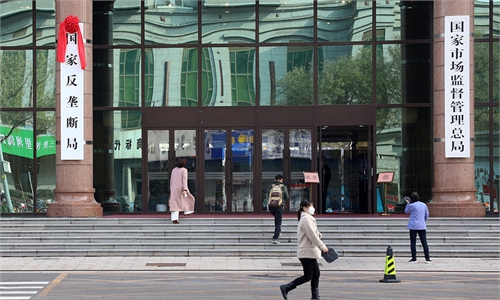China further steps up antitrust effort with new major moves
Firms fined for illegal operating concentration: observer

Photo shows the nameplate of National Anti-monopoly Bureau, which is in the same building of the State Administration for Market Regulation in Beijing. Photo: CFP
China is further intensifying its regulatory campaign against monopolistic practices with major moves over the past few days, including inaugurating the new National Anti-monopoly Bureau and fining technology giants such as Alibaba and Baidu for old deals that violate antitrust regulations.
In another significant move, officials have also begun amending the country's Anti-Monopoly Law for the first time in October, aiming to increase penalties and regulatory control, observers told the Global Times on Sunday, adding that all indicators point to increasingly intensified antitrust efforts to ensure market fairness and sustainable growth.
The State Administration for Market Regulation (SAMR) on Saturday slapped a 500,000 yuan ($78,300) on the companies for failing to declare illegal implementation of operating concentration regarding 43 merger and acquisition (M&A) deals. The deals include Beijing Baidu Wangxun Technology Co and Nanjing Wangdian Technology Co's joint purchase of Nanjing Xinfeng Network Technology Co, Alibaba's acquisition of AutoNavi Software Holdings Co, and Tencent's acquisition of China Medical Online Co.
The 43 cases involved a wide range of companies and a long transaction time span, the SAMR said on Saturday on its official WeChat account.
Alibaba and Tencent each were involved in more than ten cases. With the fresh batch disclosed, the total number of cases concerning illegal operating concentration in the internet platform sector has come to 87.
The move on Saturday came just two days after China's new National Anti-monopoly Bureau was inaugurated in Beijing on Thursday, aiming to strengthen anti-monopoly supervision in the country.
The SAMR has fined a raft of companies since the end of 2020 for monopolistic behavior, including making M&As without seeking regulatory approval in advance and forcing merchants to "choose one from two."
"Such a large scale of 43 cases as disclosed underscores Chinese regulators' determination to fight monopolies, maintain market order, and allow the industry to develop in a reasonable and healthy manner," Liu Dingding, a Beijing-based independent analyst, told the Global Times on Sunday.
Deng Zhisong, a senior partner at Beijing-based law firm Dentons, told the Global Times on Sunday that the cases announced on Saturday mainly involve internet platforms and the variable interest entity (VIE) structure.
This means that for all M&A deals, as long as they constitute an operating concentration in the future, the operators involved must declare the deals, and future deals must treat anti-monopoly concerns as a major issue when considering regulatory conditions.
"Enforcement against the illegal implementation of operating concentration in the internet platform sector is set to increase," said Deng.
"Also, China started amending its Anti-Monopoly Law for the first time in October, which will increase penalties and regulatory control," the lawyer added.
After the amendment, the amount of the illegal declaration will be changed from the previous 500,000 yuan to less than 5 million yuan, increasing the costs of illegal activity.
If the cases are serious, a fine of less than 10 percent of the previous year's revenues will be imposed, according to Deng.
The new amendment to the Anti-Monopoly Law is expected to go into effect next year.
"With the in-depth advancement of anti-monopoly law enforcement, the awareness of corporate operators' concentration declarations has continued to increase, proactively identifying and reporting concentrations that have not previously been declared as illegal, and actively cooperating with investigations," the market regulator said.
It also pointed out that dealing with undeclared cases in accordance with the law can maintain the authority of the anti-monopoly law, continuously optimize a transparent and predictable environment of fair competition, effectively prompt enterprises to enhance their compliance awareness and capabilities, and promote the healthy development of enterprises and industries.
Liu said that amid tightening regulation during recent months, some effects have emerged. For example, during the Double 11 shopping festival this year, customers did not have to choose among platforms but could follow their own preferences. Meanwhile, merchants could also take advantage of the festival to gain more users and promote sales.



